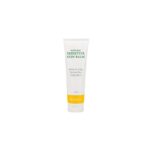





Sensitive Skin Balm 120g MooGoo
£13.90 Original price was: £13.90.£11.79Current price is: £11.79.
Sensitive Skin
MooGoo Sensitive skin is a common skin type that can be prone to reactions and irritation when exposed to certain ingredients or environmental factors. People with sensitive skin often experience redness, itching, burning, or dryness in response to various products, weather conditions, or other triggers. Here are some tips for caring for sensitive skin:
**1. Patch Test:** Before using any new skincare product, including cleansers, moisturizers, and makeup, perform a patch test on a small area of skin. This can help you identify any adverse reactions before applying the product to your entire face or body.
**2. Choose Gentle Products:** Opt for products labelled as “hypoallergenic,” “fragrance-free,” “non-comedogenic,” and “dermatologist-tested.” Look for formulations that are specifically designedwww.medicalnewstoday.com/articles/320436 for sensitive skin to minimize the risk of irritation.
**3. Minimalist Approach:** Keep your skincare routine simple. Avoid using too many products with numerous active ingredients, as this can increase the risk of adverse reactions. A basic routine might include a gentle cleanser, a moisturizer, and a sunscreen.
**4. Patch Test New Products:** Even if a product is labeled for sensitive skin, it’s still a good idea to patch test any new products. Apply a small amount to a discreet area, like behind your ear or on your inner wrist, and monitor for any adverse reactions over 24 to 48 hours.
**5. Sun Protection:** Sensitive skin can be more susceptible to sunburn and damage. Use a broad-spectrum sunscreen with at least SPF 30 daily, even on cloudy days. Look for sunscreens with physical blockers like zinc oxide or titanium dioxide, as they tend to be gentler on sensitive skin.
**6. Avoid Harsh Ingredients:** Stay away from skincare products containing harsh ingredients like alcohol, retinoids, alpha hydroxy acids (AHAs), and strong fragrances, as these can exacerbate sensitivity.
**7. Test New Makeup:** If you use makeup, choose products formulated for sensitive skin and perform patch tests with new makeup products. Also, ensure that you remove makeup thoroughly before going to bed to prevent potential irritation.
**8. Lukewarm Water:** Use lukewarm water instead of hot water for cleansing and bathing. Hot water can strip the skin of its natural oils, leading to dryness and irritation.
**9. Moisturize Regularly:** Apply a gentle, fragrance-free moisturizer to your skin after cleansing, especially after showering or bathing. This helps lock in moisture and create a protective barrier.
**10. Consult a Dermatologist:** If you’re struggling with persistent sensitivity or skin issues, consider consulting a dermatologist. They can provide personalized recommendations and treatment options tailored to your skin’s needs.
Remember that each person’s skin is unique, and what works for one individual might not work for another. It may take some trial and error to find the right products and routine that suit your sensitive skin. By being mindful of the products you use and how your skin reacts, you can help manage and minimize sensitivity-related issues.


















Reviews
There are no reviews yet.